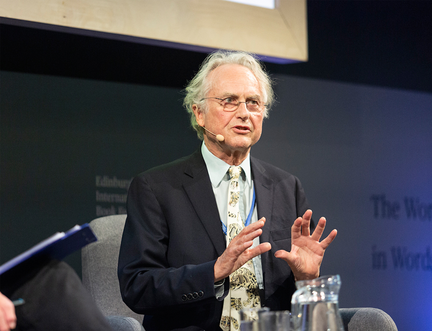More articles Wednesday 15 August 2018 12:30pm
A Brexit deal referendum the ‘only way’ to repair the damage of the 2016 vote says Richard Dawkins

The only way to undo the damage of the 2016 Brexit Referendum is to hold another according to the science writer Richard Dawkins, who discussed his new collection of essays and lectures, Science in the Soul, at the Book Festival yesterday.
In response to a question on his belief that “there is no place in the voting booth for gut instinct”, Dawkins said: “We all of us are susceptible to it, but when it comes to a really serious decision like voting then it is best to decide rationally, and on the basis of evidence, what is the best policy — rather than to be swayed by your gut feeling. And I fear that, in the Brexit Referendum, too many people were swayed by their gut and not enough were swayed by their consideration of the highly complicated issues at stake.”
He suggested that the then-Prime Minister, David Cameron, should never have offered a referendum “to people who didn’t have the time to study all the detailed ramifications of the topic."
“It is certainly a fair point that the referendum of 2016 was a straight-forward Yes/No vote without any clue of what a Yes or indeed a No vote would mean; the technical complexities have become all-too-apparent in the train-wreck of the negotiations that have been happening,” he said. “So I think that, although I disapprove of referenda – referendums – in general, the only way to undo the damage of the first one is to have a second one; in this case, not a simple Yes-No vote on the principle itself, but on the detailed terms of the negotiation that is finally arrived at.”
He insisted, however, that he was not an unequivocal advocate of the European Union, and had sympathy with the view that the UK should never have entered the then-Common Market in the first place. His hostility to the 2016 Referendum is much more fundamental.
“I’m a very strong advocate that when a major constitutional issue is at stake – like, in this case, leaving the European Union – a simple Yes/No vote on a simple majority, is not the way to proceed,” he explained. “This is a major constitutional change from a status quo that has been going for decades, and where detailed relationships – academic and economic – have been built up. This is a major change that’s irrevocable."
He suggested that, unlike in General Elections where voters can change their minds five years later, the 2016 Referendum was “for a change that was irrevocable”. He pointed out that, around the world, there is an established precedent for ensuring that major constitutional changes require more than just a simple majority.
“In the United States, constitutional amendments require a two-thirds majority in both Houses of Congress; it means they’re very hard to achieve, and I think that is a good thing. Perhaps two-thirds is too high, but 50% is too low a margin for such a drastic and irrevocable change.”
Look, Listen & Read
- 2026 Festival:
- 15-30 August
Latest News
 Major new partnership with Celtic Connections
Major new partnership with Celtic Connections




